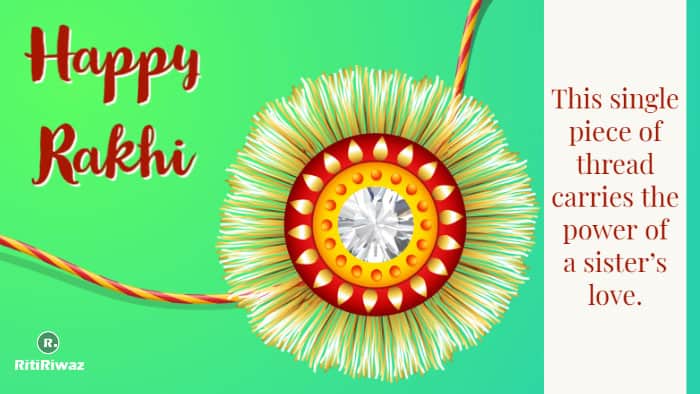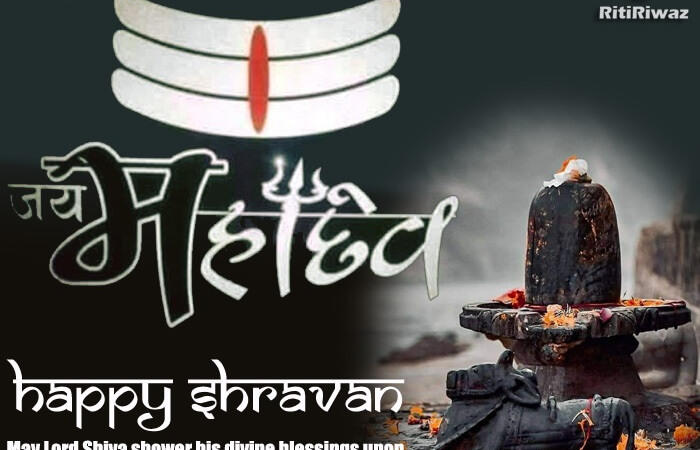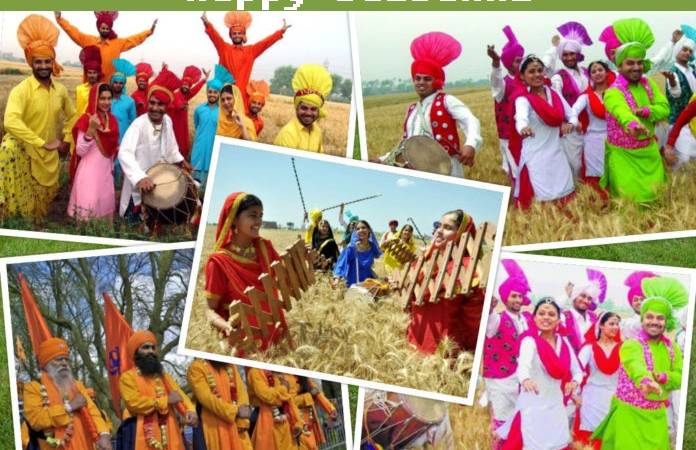Raksha Bandhan – The Universal Oneness Day

The Raksha Bandhan is a celebration of the abiding and chaste bond of love between the brother and the sister. It is also known as Rakhi Poornima as it is celebrated on the full moon (Poornima) day of the holy month Shravana (August).
The Raksha Bandhan festival stirs up one of the deepest and noblest emotions in the human heart – the abiding and chaste bond of love between the brother and the sister. The duties of brothers and the love and affection of sisters are symbolized through the tying of Rakhi. In earlier days, it was merely a festival of brothers and sisters, but now it has become of all.
Raksha Bandhan Celebration
On Raksha Bandhan day, the festivities start at daybreak. Everyone gets ready early and gathers for the worship of the deities. After invoking the blessings of the Gods, the sister performs the brother’s aarti, puts tika and chawal (rice) on his forehead, and ties Rakhi. Then she gives him sweets and gifts. The brother accepts her offerings and vows to take care of her and be by her side in her time of need. As a token, he gives the sister a return gift and sweets. Emotions can be expressed through emails, greeting cards, and rakhis through the internet or mail in case siblings cannot meet in person.
On this day, in the coastal regions of Bharat, Bharatiya people worship the rain God Indra and the Sea God Varuna. They offer coconut and seek their blessings. Fishermen start their voyages on this day for fishing. The farmers start sowing seeds on this day and pray for a good crop. It is said that Sri Rama started for Lanka to rescue Sita on this day. He crossed the sea from the bridge made by the Vanar Sena by throwing stones in the water.
The festival is observed throughout the country but with different names and acts it is called Pavitropana in Gujarat, NaraliPurnima in Maharashtra, Goa, and Karnataka, JhulanPurnima in West Bengal, AvaniAvittam in South India, Odisha and Uttarakhand, Annual fair is organized in Amritsar on the occasion of Raksha Bandhan.
Raksha Bandhan History
Thousands of events highlight the importance of the Raksha Bandhan. For instance, in Mahabharata, when Sri Krishna kills Shishupaala with his weapon, Sudarshan-Chakra, his finger gets wounded. Seeing this Draupadi tears a piece of cloth from her sari and ties on the wound. And after quite some time, when Draupadi was insulted by the Kauravas, Sri Krishna rescues her by showering saris. In another incident, once Yudhishthira asked Sri Krishna how best he could guard himself against impending evils and catastrophes in the coming year. Sri Krishna advised him to observe the Raksha ceremony.
According to another ancient legend of Bhavishya Purana, once there was a fierce battle between gods and demons. Lord Indra- the principal deity of sky, rains, and thunderbolts who was fighting the battle on the side of the Gods was having a tough resistance from the powerful demon King, Bali. The war continued for a long time and did not come to a decisive end. Seeing this, Indra’s wife Sachi went to Lord Vishnu who gave her a holy bracelet made up of cotton thread. Sachi tied the holy thread around the wrist of her husband, Lord Indra who ultimately defeated the demons and recovered the Amaravati. The earlier account of the festival described these holy threads to be amulets that were used by women for prayers and were tied to their husbands when they were leaving for war. Unlike, the present times, those holy threads were not limited to brother-sister relationships.
As per the script of Bhagavata Purana and Vishnu Purana, Lord Vishnu won the three worlds from the demon King Bali and was asked by King Bali to stay with him in the palace. The Lord Vishnu accepted the request. However, the wife of Lord Vishnu, Goddess Lakshmi wanted to return to their native place of Vaikuntha. By tying a rakhi to King Bali, they started on a bond of brother and sister. On asking about the return gift, Goddess Lakshmi asked Bali to free Lord Vishnu and let him retreat to Vaikuntha. King Bali honored the request and Lord Vishnu retreated to his place with Goddess Lakshmi.
The sister-brother relationship highlighted by the Raakhi goes far beyond the mere personal protection of a female from a male. It also implies the basic element of an amicable and harmonious social life where all members of the society look upon themselves as brothers and sisters and as children of mother Earth. In Hindu tradition, Raksha has assumed all aspects of protection of the forces of righteousness from the forces of evil.
Suggested Read: Raksha Bandhan Mehndi Design
Raksha Bandhan festival helps to develop the sentiment of the universal brotherhood which is the need of today’s world to keep social harmony and peace. The sentiment of universal brotherhood will eventually lead us to a sense of universal oneness. A society imbued with this spirit can live and prosper amidst all kinds of challenges either from within or without. Powers of intellect, body, and of material wealth and influence will then be utilized for the upliftment and service of others. The idea of the Hindu has always been:
Sarvepi sukhinah ssantu, sarve santu niraamayaah |
Sarve bhadraani pashyantu, maa kashchit duhkhabhaag bhavet ||
(Let everyone be happy, let everyone be free from all ills, let everyone behold only the auspicious, let no one be afflicted.) Raksha Bandhan is the most useful mean to bring this idea into reality.
In Sangh, the festival is celebrated in a little different way. Sangh participants not only tie Raksha to each other, but also to bhagava-dhwaj (Saffron flag). Bhagava dhwaj symbolizes the entire Hindu society. The tying of Raksha to the sacred bhagava dhwaj at the start of the function signifies this social and cultural aspect. Not only do the participants in the function develop a sense of love and affection amongst themselves but they also affirm their loyalty and devotion to the Hindu society. Their commitment to protecting each other and also society as a whole is emphasized through this simple ceremony.
Raksha Bandhan is the most auspicious occasion to recharge ourselves every year with the true spirit of service and sacrifice for the welfare of society and find therein the highest spiritual fulfillment of human life.
Happy Raksha Bandhan 2024: Quotes, Wishes, Messages, SMS, Facebook and Whatsapp status






